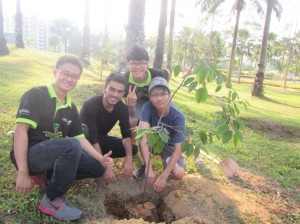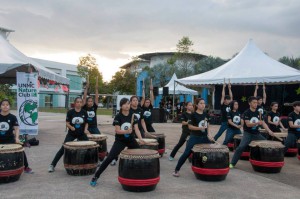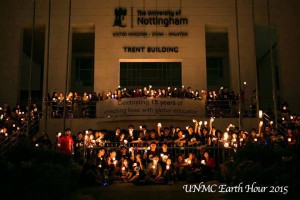
April 20, 2015, by sustainablenottingham
Green Week at UNMC: Use your Power!
Written by Associate Professor Svenja Hanson, Head of the Chemical and Environmental Engineering Department Malaysia Campus and Chair of the UNMC Environment Committee.
Just before we enter the busiest part of the year obsessing about the impending end-of-semester deadlines, the SA Sustainability Network, SA Nature Club and the Sustainability Research Network Malaysia (SRN) treated us to a whole week of wholesome green activities, culminating in the largest Earth Hour event on Malaysia Campus yet, all be it slightly earlier than in the rest of the world. It would be impossible to mention and thank everybody involved in organising the events in a short article (I’m not joking, I signed over 100 certificates, and that was for Nature Club alone), so please forgive me for not trying and just expressing general gratitude to all involved: Fantastic week!
SRN Malaysia organised a half-day sustainability seminar on the 24th March, the highlight of which was bringing one of Malaysia’s foremost environmental campaigners to campus: Yasmin Rasyid from EcoKnights spoke about the importance of involving local communities and ultimately leaving local people in charge of environmental change, rather than depending on outside volunteers. As part of her presentation she included the showing of a ‘less smiley’ version of the 2014 KL EcoFilm Fest (KLEFF) winner for best short film, a report on Mantanani, a tropical paradise island off the Sabah coast with a serious tourism and waste problem. The ‘smilier’, award winning, version can be viewed online on http://www.mengo.org/news/latest-news/131-the-struggle-towards-a-sustainable-livelihood-best-malaysian-short-film-at-kleff-2014.

Illias Umair, 2014/15 SA Sustainability Officer, joining Nature Club for the tree planting
The remaining UNMC home speakers addressed issues as varied as sustainable IT, sustainable business, food/nutrition and cleaner technology. The day ended with a panel discussion on what can be done here and now at UNMC. Meat-free Monday seemed to emerge as one of the favourites. Though there definitely is plenty to do to become greener, from saving energy and reducing waste to less likely ways to catch on such as leaving ones car at home. Note for readers on other campuses: Malaysians, even green ones, love their cars.
A very nice touch from SRN Malaysia was their choice of speaker appreciation. Instead of the usual corporate gifts, speakers were thanked with a basket of locally grown organic vegetables. Eye-catching and meaningful indeed. A brilliant idea that should catch on for future green events in my opinion.
On Wednesday the 25th the Alumni Arboretum gained four more, very special, saplings, which we hope will manage to survive thecrucial first weeks despite the hot, dry weather (maybe March is not such a good time for tree planting). Our most valued ‘tree consultants’ Dr Khadija and Dr Jean Webber from Universiti Putra Malaysia (UPM), donated the trees – thank you so much! One is a Dryobalanops Aromatica (Camphor), two Dryobalanops longifolia and the fourth and most special a Shorea Sumatrana (Kayu Meranti), which is on the critically endangered list. Thank you also to the alumni sponsors, and SA Nature Club for the planting.

“24 Drums” an accomplished UNMC based percussion group, performing during the count-down to Earth Hour.

Final destination of the Earth Hour Candle-lit walk: Group photo in front of the ‘blacked-out’ Trent building.
The grand finale of Green Week was Earth Hour, 24h early on the 27th March. During the countdown we were entertained by a great musical line-up interspaced with short green messages. The programme featured ’24 Drums’, whose campus following brought the first punters out into the plaza in the early evening, and later included local artists Bil Musa, Winson Woon and Gary Yap, which was somewhat wasted on someone of my generation. Fortunately my generation was in a tiny minority! Embedded in the high profile entertainment programme that attracted a better than ever turn-out of an estimated 500-600, the serious message during the hour of ‘lights out’ was made with a beautiful candle-lit walk around campus. It was moving seeing so many students take part, and if each participant takes the Earth Hour message to heart, next academic year we stand a chance to make actual progress towards becoming a greener campus, maybe reflected in a lower per capita energy consumption to start with?
No comments yet, fill out a comment to be the first

Leave a Reply